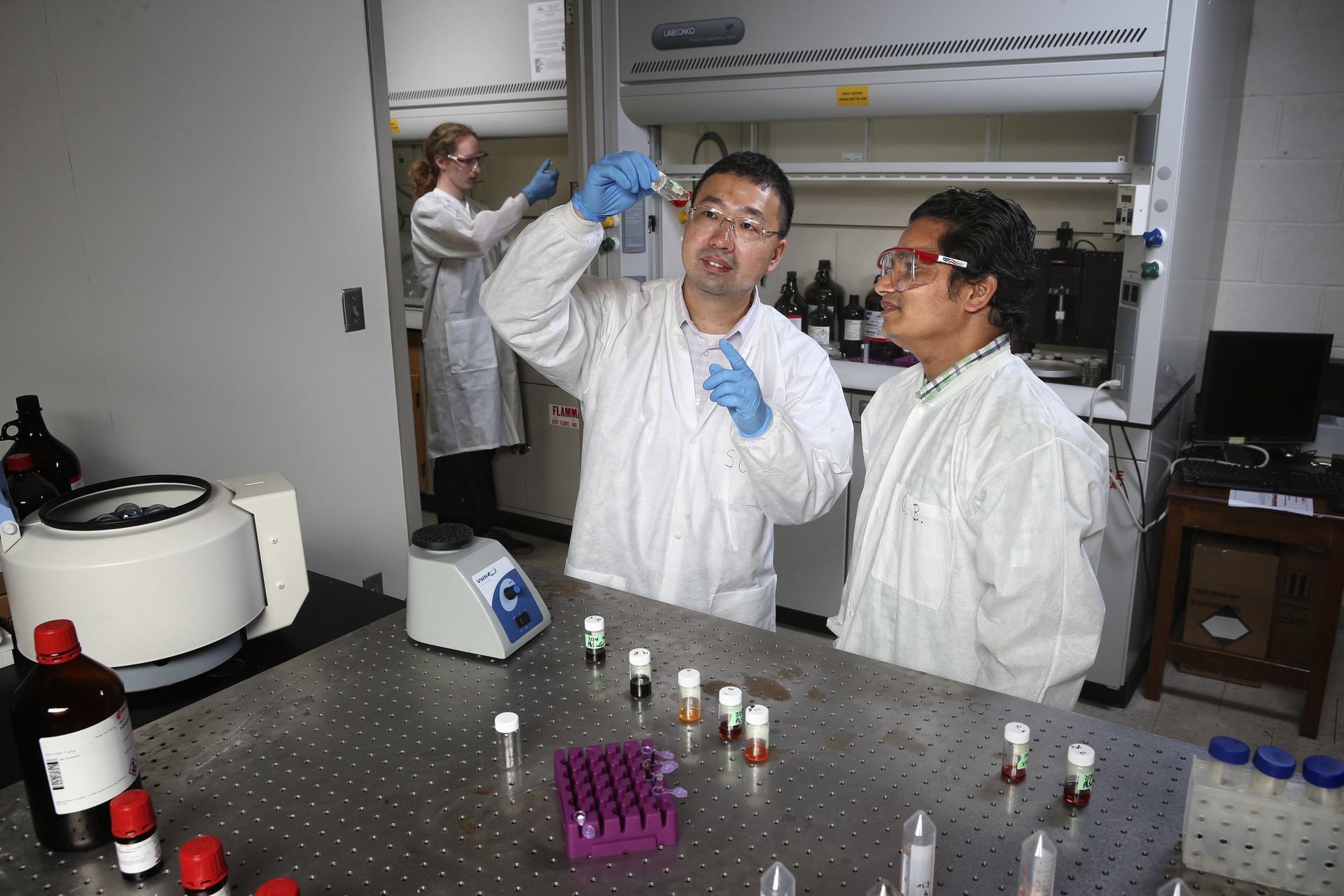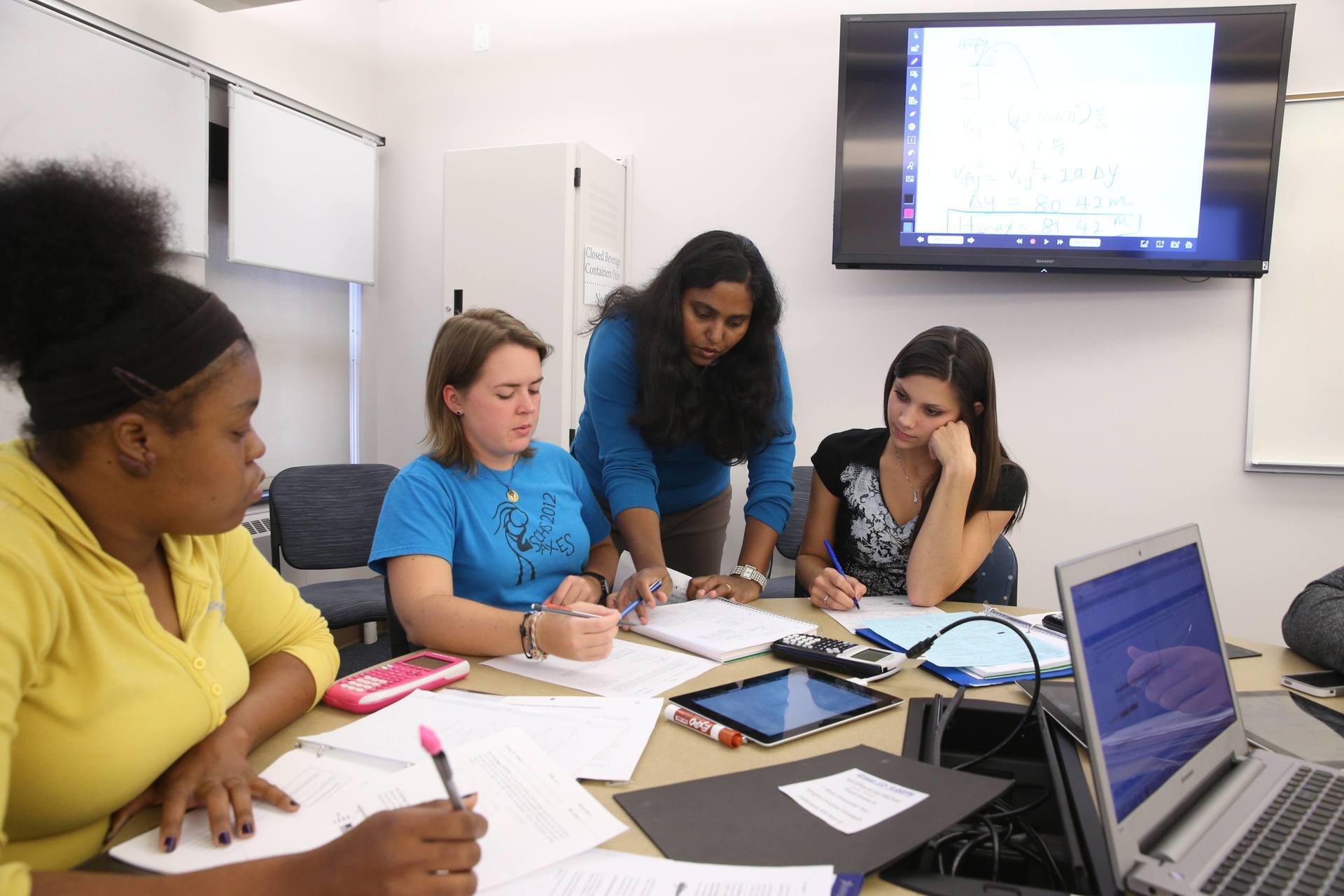Nationally recognized for student experience
The Wall Street Journal

Bachelor of Science (B.S.)
Minor
Physics
Physics moves the world forward – transforming ideas into discoveries and theories into technologies. Physicists develop next-generation semiconductors that power smartphones and design solar cells that combat climate change.
At Bowling Green State University, our Bachelor of Science in physics prepares you with a solid foundation and practical skills to lead in science, research and innovation. You’ll master experimental investigation and theoretical understanding of matter, energy and the laws governing our universe.
Learning by doing is a central theme at BGSU. Our hands-on approach and wealth of undergraduate research opportunities means you’re not just learning physics – you’re immersed in it. Research is often available only to graduate students at other universities.
Our students analyze materials for semiconductor applications, explore the cosmos by pairing the physics degree with the BGSU astronomy minor and conduct original research alongside faculty mentors. Physics majors acquire the scientific skills and problem-solving abilities that make them invaluable job candidates across industries – and prime candidates for competitive graduate programs.
Why study physics at BGSU in Ohio?
- Small class sizes. We combine the rigor expected of the best physics programs in the U.S. with personalized attention you won’t find at massive research universities. You’ll work directly with expert professors who know your name and care about your success.
- State-of-the-art laboratories. All physics majors gain hands-on experience with advanced measurement techniques and microcomputer-based data acquisition. Our cutting-edge facilities include:
- Femtosecond non-linear optics lab
- Ion-pumped UHV system with FFT infrared spectrometer
- ESR system with Tesla magnets
- Cryostats for metals and superconductors
- An rf SQUID system for ultra-sensitive voltage measurements
- Get ahead of the research game. It’s never too early to join a physics research lab and work on actual research. All research groups accept motivated undergraduate students at any time. Study material science, theoretical physics, astrophysics and more!
- On-campus connections. Join the Society of Physics Students for additional learning, discussion and to enjoy the social side of physics.
Weekly physics seminars introduce visiting scholars and homegrown research.
#1 public university in Ohio for career prep
The Wall Street Journal
Career - what can you do with a physics degree?
When people ask, “What jobs can you get with a physics degree?,” the answer isn’t simple. The analytical thinking, mathematical skills and problem-solving abilities developed in physics are highly transferable. This makes BGSU physics degree graduates attractive candidates across many fields and beyond traditional physics roles.
Our Bachelor of Science in physics degree prepares you to lead in a broad range of boundary-pushing industries:
- Astronomy
- Education
- Government
- Scientific research/academia
- Computer science
- Engineering
- Product development and more
Many physics graduates also choose to go on to competitive graduate programs in areas like:
- Applied physics
- Geophysics
- Aerospace engineering
- Electrical or mechanical engineering
- Computational science and engineering
- Biophysics
- Astronomy
- Chemistry
- Business
- Law and more
Physics degree jobs (particularly with a master’s degree) consistently rank among the highest-paying STEM careers. Salaries exceed the national average by 150%. Projected industry growth far outpaces other career fields (U.S. Bureau of Labor Statistics).
Career paths
- Energy analyst
- Engineering technician
- Environmental consultant
- Geophysicist (entry-level)
- Laboratory technician
- Nuclear power plant operator
- Patent analyst
- Quality assurance engineer
- Renewable energy product developer
- Science writer
- Technical consultant
Quick Facts from the Bureau of Labor Statistics
View average salaries
Curriculum
The rigorous 120-credit physics program cultivates analytical thinking and problem solving and combines:
- Core physics coursework
- A strong mathematical foundation (three semesters of calculus)
- Recommended chemistry coursework
- A well-rounded liberal arts education through BG Perspective requirements
You’ll explore humanities, arts, social sciences and world languages while completing our unique multidisciplinary component – four advanced courses across different fields that let you discover unexpected connections between physics and other disciplines.
Choose a conventional minor or our distinctive “general science” minor designed specifically for physics degree majors.

Sample courses
- Observational Astronomy
- Mathematical and Computational Physics
- Modern Physics
- Quantum Mechanics
- Solid State Physics
- Thermal Physics and Optics
#1 university in Ohio – big or small, public or private – students would choose again
The Wall Street Journal
Physics minor
The physics minor at BGSU provides students with a solid foundation in fundamental physics principles while complementing their major field of study.
This 21-credit program develops theoretical understanding and practical skills. It prepares students to:
- Demonstrate thorough conceptual knowledge of basic physics
- Manipulate physical constructs using mathematical computational methods
- Operate experimental apparatus
- Communicate scientific ideas effectively in oral and written formats
The comprehensive physics minor equips students with valuable analytical and problem-solving skills that boost career prospects across diverse fields, including engineering, medicine, technology and research.
The Bachelor of Science in physics is part of the Department of Physics and Astronomy in the BGSU College of Arts and Sciences.
Accreditation
Bowling Green State University [BGSU] is accredited by the Higher Learning Commission. BGSU has been accredited by the Higher Learning Commission since 01/01/1916. The most recent reaffirmation of accreditation was received in 2022-2023, with our next reaffirmation of accreditation scheduled for 2032-2033. Questions should be directed to the Office of Institutional Effectiveness.
Updated: 08/21/2025 02:25PM

